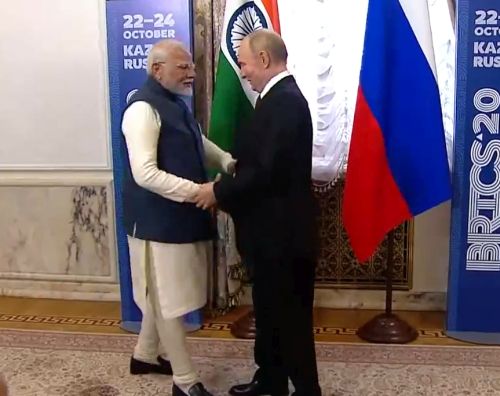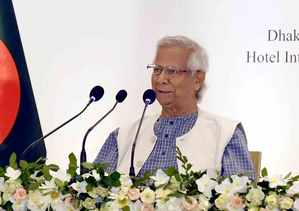International
President Xi’s purging of Communist officials: Stunning similarities with Stalin
New Delhi, May 22 (IANS) After ascending to power in 2012, President Xi Jinping of China embarked on a journey to strengthen his grip on the country’s already authoritarian regime. Having grown up in a political environment, Xi is well-versed in the workings of the Communist Party, his father being a high-ranking official of the Communist Party of China.
Purges have long been a tool used by leaders in Communist states to eliminate any form of dissent. Mao Zedong and his ‘Gang of Four’ famously purged top Communist officials in China, including Deng Xiaoping, the architect of ‘Market’ China.
However, it was Joseph Stalin, the leader of Soviet Russia, who established the early standards for purges, setting a benchmark against which other totalitarian leaders are measured.
Xi Jinping is one such leader whose paranoia and relentless efforts to maintain supremacy in the communist hierarchy have led to a series of purges targeting both low-level officials (‘flies’) and high-ranking ones (‘tigers’). Xi’s infamous anti-corruption campaign is central to these purges.
Critics argue that this campaign is a systematic strategy by Xi to completely seize control of China’s Communist Party and state machinery.
Xi’s consolidation of power
Xi Jinping belongs to the second generation of the Communist political elite. In China, descendants of the Communist political elites who participated in the Revolutionary War are known as Princelings or ‘Red Heirs,’ and Xi is one of them.
His father, Xi Zhongxun, was one of the founding fathers of the Communist Party of China and served as a former vice-premier of the nation. As noted earlier, the elder Xi experienced multiple purges during Mao’s rule due to suspicions about his activities. Xi Zhongxun was arrested in 1962 and again in 1966 during the Cultural Revolution.
Despite initial privileges and support from his father, Xi Jinping had to start from the bottom and was admitted into the Communist Party of China in 1974.
Xi came to the attention of officials during the 1989 pro-democracy Tiananmen Square protests. At the time, he was the party chief of Ningde in the southern Fujian province. Even though he was far from the capital, Beijing, localised protests erupted, which Xi effectively suppressed.
Due to these significant human rights abuses, China failed to secure the bid to host the 2000 Olympics. Ironically, this situation benefited Xi, as he was later put in charge of the 2008 Beijing Olympics.
His effective management eventually paid off, and he joined the Communist Party’s top decision-making body, the Politburo Standing Committee. In 2012, he rose to power as China’s President.
Xi and Stalin: A tale of stunning similarities
Joseph Stalin became the leader of the Soviet Union not because he exhibited classic leadership qualities but because members of the Politburo thought he could be easily manipulated. However, he had different plans.
Once he secured the position of General Secretary, he centralised all power within himself, effectively disregarding any notion of internal communist party democracy. He utilised state mechanisms to purge and execute his political rivals.
Notably, he orchestrated the assassination of Leon Trotsky, who was living in Mexico, a Central American country, at the time. Stalin exiled many of his political adversaries to Gulags, situated in the most severe environments of Russia.
To cultivate a cult of personality around himself, he authored a book titled “A Short Course on the History of the Bolsheviks,” which was published in 1938 and quickly became one of the most widely distributed books, selling over 42 million copies.
However, the book contained little historical substance and could more accurately be described as a manual for dictatorship. Scholars and experts specialising in Chinese political elites and Xi Jinping have noted his great admiration for Stalin’s book.
In a similar vein to Stalin, Xi Jinping also produced “The Political Thought of Xi Jinping.” This book represents a significant departure from Deng Xiaoping’s vision of China, who aimed to transform the nation from a rural, backward economy into a modern, state-led economy.
The recent purges within the PLA military by Xi Jinping echo the extensive purges carried out by Stalin, where, in the late 1930s, numerous prominent Old Bolsheviks were accused of treason and either executed or imprisoned. All the evidence presented in court stemmed from the defendants’ initial admissions and interrogations.
Later, it was revealed that the accused were innocent; the NKVD (Soviet Secret Police) had fabricated the cases, and the confessions had been extracted under severe coercion and torture.
Who Xi purged and what is to be deduced from it?
In the initial series of purges beginning in 2012-13, the foundation of Xi’s power consolidation began to take shape. He first targeted Zhou Yongkang, a former member of the Politburo Standing Committee and national security chief, who was charged with corruption.
Subsequently, Xi targeted the prominent ‘Four Big Tigers’, who were closely associated with the People’s Liberation Army. In the mysterious disappearances last year, China’s Defence and Foreign Ministers vanished from public view. One of the most notable incidents in this sequence was the suspicious death of Li Keqiang. He had recently retired as China’s Prime Minister and allegedly died of a heart attack in a swimming pool.
It is crucial to acknowledge that in the initial stage of purges, Xi targeted individuals who could potentially challenge his authority within the party in the future. Many of the ‘tigers’ purged by Xi were from the second generation of communist elites who came from privileged backgrounds.
This strategy cleared the path for Xi to promote his loyalists. However, Xi’s regime is not without its troubles. This is evident as he has started purging individuals previously considered close to him.
An example is Qin Gang, who ascended to prominence under Xi’s leadership and became the foreign minister. Remarkably, after meetings with the foreign ministers of Sri Lanka and Vietnam in June last year, he mysteriously disappeared. Alongside Qin, Xi also purged top officials from China’s ‘Rocket Force’, which manages the country’s nuclear arsenal.
Xi’s actions and the purges closely resemble Stalin’s tactics of consolidating power. An authoritarian framework was firmly in place, both in Stalin’s Soviet Russia and Xi’s China. The distinct impact of figures like Stalin and Xi is their monopolisation of power, leading to cycles of poor decisions attributed to subordinates.
China is currently struggling with sluggish economic growth, an ageing population, and sanctions from the United States, which exacerbate its challenges. Many of Xi’s policies have contributed to China’s current predicament, potentially inciting unrest among the populace and threatening his hold on power. He is determined to maintain control, using purges as one of several strategies.
Unlike Stalin’s era, when information flow was limited, Xi faces the modern challenge of widespread and rapid information dissemination, which increases scrutiny and fuels his paranoia.
–IANS
mr/sd
International
Lee Hsien Yang seeks refuge in United Kingdom

Lee Hsien Yang, the youngest son of Singapore’s founding father, the late Lee Kuan Yew, announced on Tuesday that he is now a political refugee in the United Kingdom after seeking asylum from the British government “as a last resort.”
“I remain a Singapore citizen and hope that someday it will be safe to return home,” Lee stated in a Facebook post, as reported by Channel News Asia (CNA).
Citing what he described as the Singapore government’s “attacks” against him, Lee, who is the younger brother of former Prime Minister Lee Hsien Loong, revealed that he sought asylum protection in 2022.
Lee Hsien Yang and his late sister, Lee Wei Ling, who passed away earlier this month, have been in conflict with their brother Lee Hsien Loong over the fate of their father’s home following his death in 2015, resulting in a public dispute that has estranged the siblings.
In an interview with the UK-based newspaper The Guardian, Lee alleged that a “campaign of persecution” compelled him to seek asylum in Britain.
In response to his claims, the Singapore government stated that there is “no basis” for his allegations of “a campaign of persecution” or other assertions regarding political repression in the country.
“Singapore’s judiciary is impartial and makes decisions independently. This is why Singaporeans have a high level of trust in the judiciary,” a government spokesperson remarked.
The spokesperson added that there are no legal restrictions preventing Lee and his wife, lawyer Lee Suet Fern, from returning to Singapore. “They are and have always been free to return to Singapore,” the spokesperson said.
Lee and his wife have been outside of Singapore since 2022, having opted not to attend a scheduled police interview regarding potential offenses related to providing false evidence in judicial proceedings concerning their father’s will and the family home.
Lee and his late sister, who had been living at the property, alleged they felt threatened while trying to fulfill their father’s wish to demolish the house. They also accused their elder brother, former Prime Minister Lee Hsien Loong, of abusing his governmental influence to advance his personal agenda.
International
Indo-Russian ties are stronger than ever before at BRICS

Kazan, Russia: Prime Minister Narendra Modi held a bilateral meeting with Russian President Vladimir Putin on the sidelines of the 16th BRICS Summit.
During the meeting, President Putin remarked, “I recall our meeting in July, where we had productive discussions on various issues. We’ve also spoken over the phone several times. I am very grateful you accepted the invitation to come to Kazan. Today, we will attend the BRICS Summit’s opening ceremony, followed by dinner.”
PM Modi responded by expressing his appreciation, saying, “I sincerely thank you for your friendship, warm welcome, and hospitality. It’s a great pleasure to visit such a beautiful city as Kazan for the BRICS Summit. India shares deep historical ties with this city, and the opening of our new embassy here will further strengthen these connections.”
International
Laos seeks to enhance nutrition amid climate change concerns

Vientiane (Laos), Aug 22 (IANS) Representatives from the Lao government and development partners have attended a conference here titled “Climate Change and Nutrition in Laos: Intersections and Interventions” to discuss the impact of climate change on nutrition in the Southeast Asia country and potential solutions.
Speaking at the conference, deputy director general of the Department of Hygiene and Health Promotion under the Lao Ministry of Health Viengkhan Phixay, said, “We gather to address a critical and interwoven issue: the impact of climate change on nutrition and how we can work together to tackle these challenges,” Xinhua news agency reported.
The Lao government is actively engaged in this endeavor, with numerous policies and initiatives aimed at addressing both climate change and nutrition, Lao National Television reported on Thursday.
“By leveraging the Scaling Up Nutrition network in Laos, which is led by the government, and supported by civil society, donors, and the United Nations, we have a robust platform to tackle the negative impacts of climate change while improving nutrition and overall health for everyone in Laos,” Viengkham said at the conference held on Monday.
The conference featured a series of presentations that not only detailed evidence-based research but also introduced innovative tools for measuring and enhancing nutrition under the impact of climate change.
The conference stressed the critical need for integrated approaches to tackle the intertwined challenges of climate change and nutrition, and setting the stage for impactful future collaborations.
–IANS
int/psd
International
One killed, seven injured in shootout in Iraq

Baghdad, Aug 22 (IANS) A civilian was killed while seven others were injured on Thursday in a tribal shootout in Iraq’s holy Shiite province of Najaf, according to a local security source.
The shootout erupted in the early hours between armed men from the local tribe in the al-Zarga area in northern Najaf, some 160 km south of Baghdad, a local police officer told Xinhua on condition of anonymity.
The clash resulted in the killing of an Iraqi civilian and the injury of seven others, including three Iranian Shiite pilgrims, the source added.
A joint force from the Interior Ministry’s emergency response division and Najaf provincial police arrested 53 gunmen from both sides of the shootout and seized weapons and ammunition, the Interior Ministry said in a statement.
It added that search operations are ongoing to locate additional gunmen and weapons, with more details to be released later.
The incident took place as numerous pilgrims traveled to the city of Karbala to observe Arbaeen, which marks the end of a 40-day mourning period for the killing of Imam Hussein, the grandson of Prophet Muhammad, in the Battle of Karbala in 680 A.D.
Typically, these pilgrims also visit Najaf as part of their journey to Karbala.
–IANS
int/jk/arm
International
Bangladesh seeks $1 billion budget support from World Bank

Dhaka, Aug 22 (IANS) Bangladesh’s interim government has sought $1 billion from the World Bank as budgetary support.
The call came from the country’s Power, Energy and Mineral Resources Adviser Muhammad Fouzul Kabir Khan’s meeting with Abdoulaye Seck, the World Bank’s Country Director for Bangladesh and Bhutan, in Dhaka on Wednesday.
He made the plea as the ministry owes more than 2 billion dollars to suppliers in import costs of power and energy, Xinhua news agency reported.
Khan mentioned that the interim government, which was formed with many pressing mandates, is due to settle a $2 billion debt left by the previous government in the power sector.
He said they have already suspended activities under the much-criticized Quick Enhancement of Electricity and Energy Supply Act 2010 and abolished the government’s power to set energy prices without any public hearing.
On August 5, the former Prime Minister of Bangladesh, Sheikh Hasina, was ousted from her country and power, ending her rule since January 2009.
This event was seen as a massive escalation, with what initially started as student’s protests and resulted in a major crisis in Bangladesh.
Earlier on August 8, Nobel laureate Muhammad Yunus took oath as the head of Bangladesh’s interim government.
–IANS
int/jk/as
-
Video2 years ago
PM Modi Attacks Congress in Karnataka with “Kerala Story”
-
Politics2 years ago
Siddaramaiah & DK Shivakumar sworn in as Chief Minister & Deputy CM respectively
-
Cricket2 years ago
CSK players rejoice 5th IPL title with their families (Pics)
-
Entertainment2 years ago
Karan Deol weds his longtime Girlfriend Drisha Acharya (Pics)
-
Sports7 years ago
History Of Official FIFA WORLD CUP Match balls
-
India2 years ago
Ashwini Vaishnaw: Railway Board recommends CBI probe in the Odisha railway disaster
-
Entertainment2 years ago
Urvashi Rautela dazzles on Cannes 2023 red carpet (Pics)
-
Entertainment2 years ago
Sunny Leone gets ready for Kennedy premiere in Cannes (Pics)






























